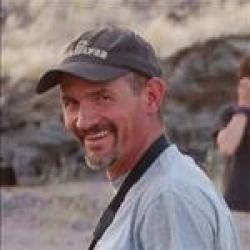George Watters, Ph.D.
George Watters is the Director of the Antarctic Ecosystem Research Division (AERD) and the U.S. Representative to the Scientific Committee for the Conservation of Antarctic Marine Living Resources. As U.S. Representative, George has primary responsibility for providing scientific advice on the conservation and management of living marine resources in the Southern Ocean. George has held his current positions since 2009, but has been active in Antarctic research since 1991, when he joined the division as a first-year Ph.D. student at U.C. San Diego’s Scripps Institution of Oceanography. George's personal research focuses on issues related to ecosystem-based management of fisheries in the Southern Ocean; he emphasizes the use of quantitative methods and regularly participates in field research.
Selected Publications:
Dahood, A., de Mutsert, K., and Watters, G.M. 2020. Evaluating Antarctic marine protected area scenarios using a dynamic food web model. Biological Conservation 251:108766. DOI: https://doi.org/10.1016/j.biocon.2020.108766.
Dahood, A., Klein, E.S, and Watters, G.M. 2020. Planning for success: leveraging two ecosystem models to support development of an Antarctic marine protected area. Marine Policy 121:104109. DOI: https://doi.org/10.1016/j.marpol.2020.104109.
Hinke, J.T., Watters, G.M., Reiss, C.S., Santora, J.A., and Santos, M.M. 2020. Acute bottlenecks to the survival of juvenile Pygoscelis penguins occur immediately after fledging. Biology Letters 16:20200645. DOI: http://dx.doi.org/10.1098/rsbl.2020.0645.
Klein, E.S. and Watters, G.M.. 2020. Comparing feedback and spatial approaches to advance ecosystem-based fisheries management in a changing Antarctic. PLoS ONE 15(9):e0231954. DOI: https://doi.org/10.1371/journal.pone.0231954.
Klein, E.S. and Watters, G.M. 2020. What’s the catch? Profiling the benefits and costs associated with marine protected areas and displaced fishing in the Scotia Sea. PLoS ONE 15(8):e0237425. DOI: https://doi.org/10.1371/journal.pone.0237425.
Reiss, C.S., Hinke, J.T., and Watters, G.M. 2020. Demographic and maturity patterns of Antarctic krill (Euphausia superba) in an overwintering hotspot. Polar Biology 43(9):1233-1245. DOI: https://doi.org/10.1007/s00300-020-02704-4.
Walsh, J., Reiss, C.S., and Watters, G.M. 2020. Flexibility in Antarctic krill Euphausia superba decouples diet and recruitment from overwinter sea-ice conditions in the northern Antarctic Peninsula. Marine Ecology Progress Series 642:1-19. DOI: https://doi.org/10.3354/meps13325.
Watters, G.M., Hinke, J.T., and Reiss, C.S. 2020. Long-term observations from Antarctica demonstrate that mismatched scales of fisheries management and predator-prey interaction lead to erroneous conclusions about precaution. Scientific Reports 10:2314. DOI: https://doi.org/10.1038/s41598-020-59223-9.
